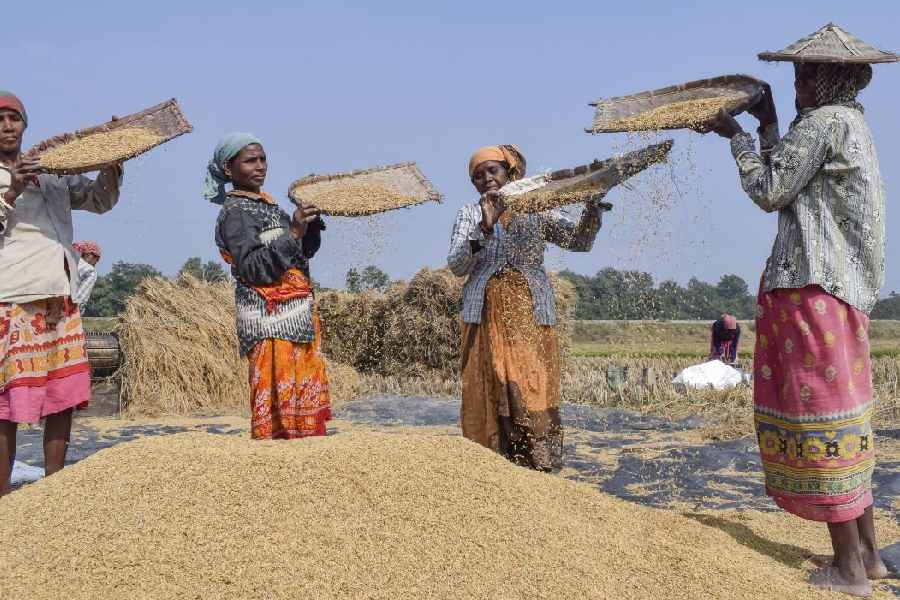The Mamata Banerjee government has set a goal of buying 68 lakh tonnes of paddy directly from farmers during the 2024-25 procurement year amid questions about whether the target could be achieved since the cash-strapped state did not increase the incentive over and above the Centre’s minimum support price (MSP) for the produce.
According to a policy and guideline framed by the state food and supplies department recently, the government would procure 68 lakh tonnes of paddy directly from the farmers by providing an incentive of ₹20 a quintal, in addition to the Centre’s announced MSP of ₹2,300 a quintal.
Senior bureaucrats aware of the development said since the farmers were not set to get a good incentive, the government could face problems in achieving the procurement target.
Last year, the state government had set a target of procuring 70 lakh tonnes of paddy, but only 51.32 lakh tonnes could be collected. Senior officials pointed out that the main reason behind the state’s failure to achieve the procurement target was the poor incentive for the farmers.
“The state had announced an incentive of ₹20 a quintal over the Centre’s MSP of ₹2,183 a quintal. It seems that the state did not learn its lesson and that’s why it announced an incentive of ₹20 a quintal this year even though the Centre’s MSP has been increased to ₹2,300 from ₹2,183a quintal,” said a seniorbureaucrat.
Sources also said the Bengal government should learn from states like Chhatisgarh and Odisha where the BJP-led governments announced an incentive of ₹800 a quintal over and above the Centre’s MSP of ₹2,300.
“This means, a farmer in Bengal would get ₹2,320 a quintal for the produce, while a farmer in Chhatisgarh and Odisha would get ₹3,100 a quintal. This is a huge difference given that more than 80 per cent of Bengal’s 72 lakh farmers are small and marginal,” said a senior government official.
The official also said even a small state like Jharkhand announced an incentive of ₹100 a quintal over and above the Centre’s MSP to ensure that farmers got better prices for their produce.
“Can’t we cut some expenditure and secure a better price for the paddy produced by the farmers as it is the crop almost all farmers in the state depend on,” asked the official.
Another official explained why announcing a better incentive was important to achieve the procurement target.
Farmers sell their produce to the government only when they get a better price. Otherwise, they sell the produce in the open market since they have to fulfil several preconditions for selling paddy to the state. The price offered by the government did not attract the farmers as they were getting almost the same price in the open market, the official said.
“The scenario is not likely to change this year, too. Paddy production could take a hit this year because of floods and Cyclone Dana. The shortage in production could push the price of paddy up in the open market and the government would not be able to attract the farmers with this low incentive,” said the official.
A senior official at Nabanna said the government was not in a position to spend more on the incentive after giving money to farmers under the Krishak Bandhu scheme since the Centre had stopped the release of funds under several development schemes.
“The states that pay huge incentives for procuring paddy do not give direct benefit to the farmers as we do under Krishak Bandhu,” said the official.
However, a section of officials said farmers preferred getting a better price for their produce than the government paying a maximum amount of ₹10,000 annually through schemes like Krishak Bandhu.
The officials said if the state failed to achieve the procurement target, it might find it difficult to run its cheap grain scheme ahead of the 2026 Assembly polls.
“This year, the state managed the situation as the government secured additional rice from the central pool. But the Centre might not come forward to save the state every time, particularly ahead of the Assembly polls,” said a source.
Sources said the state could reconsider whether it really needed to give cheap grain to nearly two crore people who are not covered under the National Food Security Act (NFSA).
“The state spends nearly ₹5,000 crore annually to run the cheap grain schemes which don’t serve the poor actually. Instead, the state can announce a handsomeincentive for the farmers while procuring paddy. This would help the state increase paddy production, too,” saida bureaucrat.











